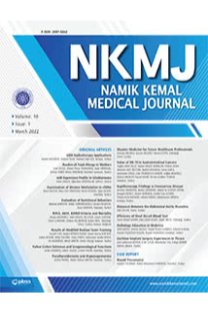SAĞLIK BİLİMLERİ FAKÜLTESİ ÖĞRENCİLERİNİN PSİKOBİYOTİK ÖZELLİK GÖSTEREN BESİNLERİN TÜKETİM DURUMLARI İLE MUTLULUK DÜZEYLERİ ARASINDAKİ İLİŞKİSİ
The Relationship Between Consumption Status and Happiness of Psychobiotic Foods of Faculty of Health Sciences Students
___
- 1. Veenhoven R: Happiness: Also Known as “Life Satisfaction” and “Subjective Well-Being”. In: Land KC, Michalos, AC, Sirgy MJ (eds), Handbook of Social Indicators and Quality of Life Research. 2012;63-77.
- 2. Guerra-Bustamante J, León-Del-Barco B, Yuste-Tosina R, López-Ramos VM, Mendo-Lázaro S. Emotional intelligence and psychological well-being in adolescents. Int J Environ Res Public Health. 2019;16(10):1720.
- 3. Lesani A, Mohammadpoorasl A, Javadi M, Ansari H, Fakhari A. Happiness among college students: A cross-sectional webbased study among Iranian medical students. Biotechnology and Health Sciences. 2016;In Press.
- 4. Owen L, Corfe B. The role of diet and nutrition on mental health and wellbeing. Proc Nutr Soc. 2017;76(4):425-426.
- 5. Lim SY, Kim EJ, Kim A, Lee HJ, Choi HJ, Yang SJ. Nutritional factors affecting mental health. Clin Nutr Res. 2016;5(3):143- 152.
- 6. Dinan TG, Stanton C, Cryan JF. Psychobiotics: a novel class of psychotropic. Biol Psychiatry. 2013;74(10):720-726.
- 7. Kopp-Hoolihan L. Prophylactic and therapeutic uses of probiotics: A review. J Am Diet Assoc. 2001;101(2):229-238.
- 8. Sarkar A, Lehto SM, Harty S, Dinan TG, Cryan JF, Burnet PWJ. Psychobiotics and the manipulation of bacteria-gut-brain signals. Trends Neurosci. 2016;39(11):763-781.
- 9. Clarke G, Stilling RM, Kennedy PJ, Stanton C, Cryan JF, Dinan TG. Minireview: Gut microbiota: The neglected endocrine organ. Mol Endocrinol. 2014;28(8):1221-38.
- 10. 10. Bermudez-Humaran LG, Salinas E, Ortiz GG, Ramirez-Jirano LJ, Morales JA, Bitzer-Quintero OK. From probiotics to psychobiotics: Live beneficial bacteria which act on the brain-gut axis. Nutrients. 2019;11(4):890.
- 11. 11. Marotta A, Sarno E, Del Casale A, Pane M, Mogna L, Amoruso A, et al. Effects of probiotics on cognitive reactivity, mood, and sleep quality. Front Psychiatry. 2019;10:164.
- 12. Misra S, Mohanty D. Psychobiotics: A new approach for treating mental illness? Crit Rev Food Sci Nutr. 2019;59(8):1230- 36.
- 13. Foster JA, McVey Neufeld KA. Gut-brain axis: How the microbiome influences anxiety and depression. Trends Neurosci. 2013;36(5):305-312.
- 14. 14. Chi L, Khan I, Lin Z, Zhang J, Lee MYS, Leong W, et al. Fructo-oligosaccharides from Morinda officinalis remodeled gut microbiota and alleviated depression features in a stress rat model. Phytomedicine. 2019;67:153157.
- 15. Karakula-Juchnowicz H, Rog J, Juchnowicz D, Loniewski I, Skonieczna-Zydecka K, Krukow P, et al. The study evaluating the effect of probiotic supplementation on the mental status, inflammation, and intestinal barrier in major depressive disorder patients using gluten-free or gluten-containing diet (SANGUT study): A 12-week, randomized, double-blind, and placebocontrolled clinical study protocol. Nutr J. 2019;18(1):50.
- 16. Pekcan G. Beslenme durumunun saptanmasi.Diyet El Kitabı(3.baskı).Ankara:Hatiboğlu Yayınları.2008;67-141.
- 17. Khosrojerdi Z, Tagharrobi Z, Sooki Z, Sharifi K. Predictors of happiness among Iranian nurses. Int J Nurs Sci. 2018;5(3):281-286.
- 18. Doğan T, Sapmaz F. Oxford mutluluk ölçeği Türkçe formunun psikometrik özelliklerinin üniversite öğrencilerinde incelenmesi. Düşünen Adam Psikiyatri ve Nörolojik Bilimler Dergisi. 2012;25(4):297-304.
- 19. 19. Marshall AL, Smith BJ, Bauman AE, Kaur S. Reliability and validity of a brief physical activity assessment for use by family doctors. Br J Sports Med. 2005;39(5):294-7.
- 20. Bahrami S, Rajaeepour S, Rizi HA, Zahmatkesh M, Nematolahi Z. The relationship between students' study habits, happiness and depression. Iran J Nurs Midwifery Res. 2011;16(3):217-21.
- 21. Carr D, Friedman MA, Jaffe K. Understanding the relationship between obesity and positive and negative affect: The role of psychosocial mechanisms. Body Image. 2007;4:165-77.
- 22. van Wijk CH. Mood States are not associated with BMI in Mentally Healthy Adults. Psychology. 2011;2(5):492-6.
- 23. Kim HK, Kim SH, Jang CS, Kim SI, Kweon CO, Kim BW, et al. The combined effects of yogurt and exercise in healthy adults: Implications for biomarkers of depression and cardiovascular diseases. Food Sci Nutr. 2018;6(7):1968-74.
- 24. Marotta A, Sarno E, Del Casale A, Pane M, Mogna L, Amoruso A, et al. Effects of probiotics on cognitive reactivity, mood, and sleep quality. Front Psychiatry. 2019;10:164.
- 25. Kim CS, Shin DM. Probiotic food consumption is associated with lower severity and prevalence of depression: A nationwide cross-sectional study. Nutrition. 2019;63-64:169-74.
- 26. Mohammadi AA, Jazayeri S, Khosravi-Darani K, Solati Z, Mohammadpour N, Asemi Z, et al. The effects of probiotics on mental health and hypothalamic-pituitary-adrenal axis: A randomized, double-blind, placebo-controlled trial in petrochemical workers. Nutr Neurosci. 2016;19(9):387-95.
- 27. Macht M, Dettmer D. Everyday mood and emotions after eating a chocolate bar or an apple. Appetite. 2006;46(3):332-336.
- 28. Zare A, Khaksar Z, Sobhani Z, Amini M. Analgesic Effect of Valerian Root and Turnip Extracts. World J Plast Surg. 2018;7(3):345-50.
- 29. Darwish M, Osman N, Mfs F, Yonies B. Turnip (Brassica Rapa L.) Attenuate liver and kidney damage induced by gamma irradiation in rats. BAOJ Pharmaceutical Sciences. 2016;2:28-33.
- ISSN: 2587-0262
- Yayın Aralığı: 4
- Başlangıç: 2013
- Yayıncı: Galenos Yayınevi
Sezaryen ile Doğmuş Genç Erişkinlerin Kardiyovasküler Sistem Özellikleri
Bahadır KIRILMAZ, Ercan AKŞİT, Özge Turgay YILDIRIM, Hasan BOZKURT, Emine GAZİ, Melike EDİNCİKLİOĞLU
TEKİRDAĞ BÖLGESİ DERMATOMİKOZ HASTALARININ KLİNİK, DEMOGRAFİK VE LABORATUVAR SONUÇLARI
Hülya ALBAYRAK, Onur RAİMOĞLU, Mine AYDIN KURÇ, Mehmet Emin YANIK, Aynur Eren TOPKAYA
Kurt Postunda Koyun mu veya Koyun Postunda Kurt mu? Keratoakantom
Mehmet BEKERECİOĞLU, Fatma BİLGEN, Alper URAL
Sevliya ÖCAL DEMİR, Müferet ERGÜVEN
OTİZM SPEKTRUM BOZUKLUĞUNUN NEDENLERİNE AİT EBEVEYN ALGISININ TEDAVİ TERCİHİNE ETKİSİ
Miraç Barış USTA, Ayşegül DUMAN KURT, Hatice GÜLŞEN, Koray KARABEKİROĞLU
Kanser Hastalarında Uyku Kalitesini Etkileyen Faktörler
Nilay Şengül SAMANCI, Burç Çağrı POYRAZ, Fuat Hulusi DEMİRELLİ, Emir ÇELİK, Ezgi DEĞERLİ, Kerem ORUÇ, Şahin BEDİR, Sümeyra DERİN, Nihan ŞENTÜRK ÖZTAŞ, Zeynep Hande TURNA, Melih KASAP
Sinan ATEŞ, Füsun VAROL, Cenk SAYIN, Cem YENER, Havva SÜTÇÜ, Esra ALTAN
Meltem ÖZNUR, Ayşegül İSAL ARSLAN, Murat AKGÜL, Cenk Murat YAZICI, Enes ALTIN
